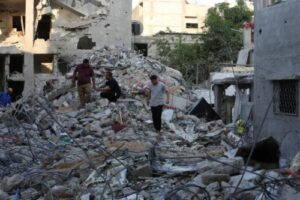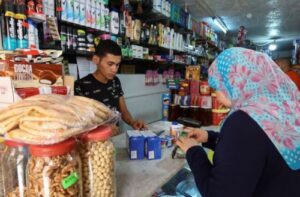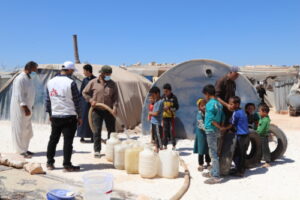
The National Interest Foundation Newsletter
Issue 162, September 29, 2022
Welcome to our NIF Newsletter. In this week’s headlines: WikiLeaks documents uncover how Israeli officials have coordinated with top Hollywood executives in an attempt to whitewash war crimes and human rights abuses, hundreds of Tunisian demonstrators take to the streets to protest against high prices and food shortages amid the country’s ongoing political crisis, and humanitarian aid organizations warn of a rapidly growing cholera outbreak in Syria.
Attempts to Whitewash Israeli War Crimes

In the face of Israeli war crimes and human rights violations, evidence of corroboration aimed at silencing justifiable condemnation in the entertainment industry and beyond resurfaces. (Photo from AP)
WikiLeaks Documents Uncover How Israeli Officials Have Coordinated with Top Hollywood Executives in an Attempt to Whitewash War Crimes and Human Rights Abuses
Following Israel’s heinous 2014 bombing of the Gaza Strip that left thousands dead and countless more without homes, WikiLeaks posted a horde of emails in 2015 dubbed the Sony Archive, which revealed a coordinated effort by high-flying Hollywood elites to push pro-Israel propaganda upon American, British, and European media. The revelations were unsettling, but did not come as a surprise to many social justice activists, who have long spoken about pro-Israeli biases in mainstream media. The importance of uncovering this and maintaining focus on the issue remain relevant, as Israel continues to violate international and human rights laws, from its persisting abuse of Palestinians to its recent provocative rhetoric during maritime border dispute negotiations with Lebanon. Social media, however, is starting to play a larger role in the Israeli-Palestinian conflict. There is video evidence of Israeli violations against Palestinians seemingly every day, and as social media coverage of the issue has become more prevalent, so too has the growing sentiment among Americans that Israel is in fact the oppressor.
On the other hand, Hollywood has not moved in the direction of supporting Palestine. Despite having a reputation for being a far-left institution, much of Hollywood remains staunchly pro-Israel, more than seven years after the Sony Archive was first leaked. The large email cache is certainly not lacking star power, containing names that include prominent executives and producers such as Ben Silverman of The Office, as well as actors Natalie Portman and Scarlett Johansson. The revelations uncovered that a group exchanged several emails prompting one another to “boycott the boycotters” of Israeli-related items and to leverage their connections at prominent film festivals, corporations, and other venues to prevent Israel’s cancellation from popular culture. In a lengthy email resembling a call to arms, producer Ron Rotholz wrote to his peers that “what we can do is urge the leaders of major film, tv and theater organizations, festivals, markets and potentially the heads of media corporations to issue official statements condemning any form of cultural or economic boycotts against Israel.” In an even more forcible statement, Rotholz later wrote that the group “must urge industry leaders in the U.S., U.K., and Europe to take an ABSOLUTE position regarding the legitimacy and continued security and support for the Jewish state and its population.” Moreover, the words of the group were not merely grumblings and empty promises. Silverman, for example, attempted to shut down “The Death of Klinghoffer,” an opera at the MET on the basis of being anti-Semitic. Additionally, participants in the email chain are paranoid that growing support for Palestine is an indication of a second Holocaust. In Ryan Kavanaugh’s own words, “it is [their] job to keep another Holocaust from happening.” Sadly, this email chain is not alone in its way of thinking. Creative Community for Peace (CCFP), founded in 2011, is another group of Hollywood stars dedicated to the protection of Israel’s image. Signatories of their pro-Israel petition include Seth Rogen and Sylvester Stallone.
Over the years, Israeli propaganda has entered U.S. mainstream media under a variety of guises. When Israel first became a country in the late 1940s, it was portrayed as the lovable victim of Muslim aggressors. Later, it was viewed as an enviable, tough, unflinching powerhouse in the face of danger. As Israelis themselves have become more involved in the production of pro-Israel media in the U.S., it has also become more nuanced. In recent news, Marvel hero Sabra, an Israeli Mossad agent, will appear in the next Captain America movie. Outside of the world of movies and TV, American support for Israel has been drummed up by the use of Israeli military women as sex symbols. The concept of “hot Israeli army women” has an entire corner of the internet, and even a section on Maxim’s website. At Israel’s Defense, Homeland Security and Cyber Exhibition (ISDEF), a group known as Alpha Gun Angels has been known to make an appearance. The group consists of Israeli military women who pose in risqué clothing with guns in hand. Most posts were targeted towards an American audience, with hashtags referring to such things as the protection of second amendment rights. Their Instagram account is now defunct.
Despite the powerful pro-Israel crowd in Hollywood, there are those who have spoken out against Israel’s transgressions and in support of Palestine. Actors Penélope Cruz and Javier Bardem came under fire for their signing of a letter condemning Israel’s actions in Gaza and were even threatened with losing roles. Filmmaker Ken Loach also drew the ire of the pro-Israeli community in Hollywood by supporting a boycott of Israeli culture and sports. In response to his statement, Ryan Kavanaugh attempted to get the Cannes Film Festival cancelled, as one of Loach’s films was a top contender to win. Clearly, those who back the Palestinian cause may continue to face serious repercussions in Hollywood. Nevertheless, Hollywood needs the support of the everyday American to thrive, and as public opinion continues to sway in support of Palestinian rights, Hollywood may soon find itself with a difficult decision to make.
Protests in Tunisia Over Inflation and Food Shortages

Many Tunisians have been hit hard by substantial food shortages and price hikes. (Photo from Reuters)
Hundreds of Tunisian Demonstrators Take to the Streets to Protest Against High Prices and Food Shortages Amid the Country’s Ongoing Political Crisis
During the preceding week, hundreds of demonstrators have taken to the streets of Tunisia in protest against surging prices and food shortages amid the country’s ongoing political crisis. Earlier this month, the Tunisian government raised the price of cooking gas cylinders by 14%, the first such hike in over a decade. They also increased fuel prices for the fourth time this year in an effort to reduce energy subsidies, as authorities scramble to secure a loan from the International Monetary Fund (IMF) to save public finances from collapse. Compounding economic challenges is a high inflation rate of 9%, and food shortages that have resulted in massive price surges. Many Tunisians have reported spending hours searching for essential goods such as milk, butter, sugar, and rice, among others. During some of the recent protests organized by civil society groups and political parties, police used sticks and pepper spray to disperse demonstrators, arresting several of them. There is concern that deteriorating economic conditions, combined with dissatisfaction at the authoritarian-like actions of the Saied regime, could boil over into the potential for further civil unrest.
Tunisian President Kais Saied suspended parliament back in July of 2021, dismissing the country’s prime minister and announcing plans to rule by decree – behavior that was widely condemned by pro-democracy advocates and defenders. Saied gradually initiated other actions aimed at consolidating his power and altered the country’s democratic constitution. The referendum on the new constitution was boycotted by much of Tunisian civil society and the population at-large, with a turnout of only around 30%. The document grants almost unlimited power to President Kais Saied, and was thus denounced by pro-democracy opposition groups. Some of the other autocratic actions taken by Saied included the issuing of a decree which dissolved the Supreme Judicial Council, the country’s top independent judiciary body. Less than a week after this, Saied established a council filled with members that he himself chose. The decree granted the biased pro-Saied council the right to appoint judges and oversee transfers, promotions, dismissals, and resignation requests. Saied granted himself the power to object to any of the council’s planned actions and the ability to directly dismiss any judge. His government has announced plans for legislative elections in December, however many political parties have indicated their intent to boycott these too so as not to give them undeserved legitimacy.
The ongoing political crisis in Tunisia has been coupled with economic challenges as well, which prompted this past week’s demonstrations. Protesters took to the streets holding loaves of bread in the air, angry youths burned tires, and others chanted slogans like “jobs, freedom, and national dignity” and “we can’t support crazy price hikes.” President Saied has been trying to distract Tunisians from the grim reality that the country is suffering from major economic difficulties and the problems have only been exacerbated by the war in Ukraine, which has sent grain prices skyrocketing. Tunisia is also facing a dire financial predicament with public sector spending being a large portion of the state’s budget. In 2020, the public debt rose 70% above the country’s gross domestic product. The nation’s lack of a well-regulated private sector has left many citizens reliant on the state for jobs and subsidized goods and services. This has created an unsustainable economic imbalance that is seemingly crashing down. The government is seeking an IMF bailout to help it fund its budget and debt repayments. Without an IMF bailout, Tunisia would likely have to borrow internally, restricting credit to local businesses in ways that experts say could further harm the economy and anger citizens.
Concern Regarding Cholera Outbreak in Syria

The longstanding conflict in Syria has had a detrimental impact on access to clean water. (Photo from AP)
Humanitarian Aid Organizations Warn of a Rapidly Growing Cholera Outbreak in Syria
The International Rescue Committee (IRC) and other humanitarian aid organizations have issued warnings regarding the troubling cholera outbreak in Syria. Cases of the disease continue to rise in what has been deemed the first such happening in more than a decade. Observers highlight that one of the major causes of the health crisis is the lack of access to clean water as a result of the longstanding Syrian conflict, which has left many reliant on unsafe sources due to destruction of the national water infrastructure. According to experts, the war has damaged two-thirds of water treatment plants, half of pumping stations, and one-third of water towers in the country. The cholera outbreak has killed at least 29 people, and the total number of confirmed infections has surpassed 2,000. There are also fears that a substantial under-reporting of suspected cases is likely, particularly in the northeast areas of the country.
Cholera is an acute diarrheal illness caused by infection of the intestine with Vibrio cholerae bacteria. People can get sick when they swallow food or water contaminated with cholera bacteria. Analysts suspect that the outbreak is linked to the presence of bacteria in the waters of the Euphrates River. The safety of the river water has experienced a serious decline due to the effects of climate change turning it into a swamp land in many areas. Exacerbating the issue is the fact that an estimated 30% of the Syrian population relies on the Euphrates River for drinking water sources.
The first confirmed cholera cases were detected almost a month ago in Deir al-Zor province, before spreading to other areas including the cities of Raqqa and Hasaka. There are more than 4,350 suspected cases and at least 100 confirmed cases in the northeastern region of Syria alone. The disease is impacting a growing number of civilians across the country. Additionally alarming is that about 590 vulnerable refugee camps in the Idlib region suffer from a lack of clean drinking water, and 226 possess meager amounts of clean water. Furthermore, over half of the camps suffer from an open sewage system, which is an incubator for the spread of infectious diseases such as cholera.
This outbreak of cholera is only a symptom of the overarching issue of water shortage in Syria, caused almost exclusively by the conflict that has ravaged the country since 2011. Previously, over 90% of Syrians had access to safe and clean drinking water. Now, however, that number has decreased by 40%. The water shortage has led to mandated water rationing, which does not provide families with sufficient water and thus pushes them to unclean sources that are teeming with diseases such as cholera. The reasons for the water shortage are varied, but hardly difficult to understand given the devastation of the longstanding Syrian conflict. Violence has directly destroyed infrastructure responsible for the production of clean water, and has caused a sharp reduction in the number of employees working in the water production industry. The conflict has also hindered waste removal efforts, allowing contaminants into the water supply, which not only makes the water unsafe to drink but damages the quality of food and the environment itself. Scientific research also suggests that Syria is being negatively impacted by the effects of climate change which have made the region increasingly more arid and prone to drought. Experts warn over the potential for an abundance of outbreaks in the near future if actions are not taken to mitigate the aforementioned factors.
Enter the text or HTML code here
